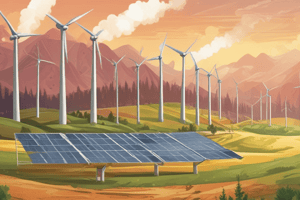Podcast
Questions and Answers
What is a major disadvantage of using biomass energy?
What is a major disadvantage of using biomass energy?
- It generates large amounts of carbon dioxide (correct)
- It is costly to produce
- It requires a lot of land to produce the necessary organic material (correct)
- It is only available in certain locations
What does the principle of the conservation of energy state?
What does the principle of the conservation of energy state?
- Energy cannot be created or destroyed, only transferred or converted (correct)
- Energy can be created and destroyed
- Energy cannot be destroyed, only created
- Energy is always lost in a system
How does biomass generate power?
How does biomass generate power?
- By capturing energy from the sun
- By using the Earth's heat to produce steam
- By burning organic material to produce heat and electricity (correct)
- By harnessing the motion of air
What is tidal/wave energy?
What is tidal/wave energy?
What is a source of wind energy?
What is a source of wind energy?
What is energy?
What is energy?
How does solar energy generate power?
How does solar energy generate power?
Which of the following is a disadvantage of solar energy?
Which of the following is a disadvantage of solar energy?
Which energy source is primarily derived from the sun?
Which energy source is primarily derived from the sun?
What is a key principle behind the use of hydroelectric energy?
What is a key principle behind the use of hydroelectric energy?
Study Notes
Biomass Energy Disadvantages
- Biomass energy generates large amounts of carbon dioxide, contributing to greenhouse gas emissions.
- Production of biomass can be land-intensive, requiring substantial agricultural space for organic material.
- Although its production can be costly, the environmental impacts are a more significant concern.
Conservation of Energy
- The principle of conservation of energy asserts that energy cannot be created or destroyed, only transformed from one form to another.
- This principle emphasizes the transfer and conversion of energy within closed systems.
Biomass Power Generation
- Biomass energy is produced by burning organic materials, which generates heat to produce electricity.
- This process utilizes the stored energy in plant matter and waste products, converting it into usable power.
Tidal/Wave Energy
- Tidal and wave energy is derived from the movement of ocean tides and waves.
- This renewable energy source exploits the natural motion of water bodies to generate power.
Wind Energy Sources
- Wind energy primarily originates from the sunlight, which warms the Earth's surface unevenly, creating wind currents.
- The Earth's rotation also contributes to wind patterns, enabling the use of turbines to harness wind energy.
Definition of Energy
- Energy is defined as the ability to perform work, encompassing various forms such as kinetic, potential, thermal, and electrical energy.
Solar Energy Generation
- Solar energy is generated by converting sunlight into electricity through photovoltaic cells.
- This technology captures solar radiation, facilitating the generation of renewable energy without emissions.
Studying That Suits You
Use AI to generate personalized quizzes and flashcards to suit your learning preferences.
Related Documents
Description
Explore the various forms of renewable energy, including biomass, tidal, and wave energy. Understand the disadvantages associated with biomass energy and the principle of energy conservation. This quiz will test your knowledge on how these energy sources work and their environmental impact.






